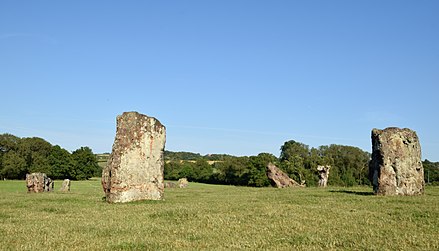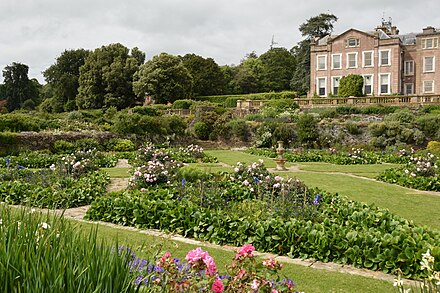Somerset (England) - ceremonial county of England (use Q21694741 for administrative non-metropolitan county)
Somerset is a county in the West Country of England.
Cities
Cities
- Bristol 📍 (a separate county that is not covered in this article)
- Wells 📍 — England's smallest city.
- Bath 📍 — Roman and Georgian spa town with Roman baths and Georgian architecture; the entire city is a .
Towns
- Taunton 📍 – the county town
- Bridgwater 📍
- Clevedon 📍 – seaside resort with pier
- Glastonbury 📍 — a town known for its Tor and New Age associations, plus its nearby music festival
- Ilminster 📍
- Langport 📍 – small town in the heart of the Levels
- Minehead 📍
- Porlock
- Portishead 📍
- Shepton Mallet 📍
- Watchet 📍
- Weston-super-Mare 📍 – traditional seaside resort
- Wincanton 📍
- Yeovil 📍
Villages
- Cheddar 📍
- Long Ashton
- The Exmoor villages of Dunster, Oare, Porlock, Porlock Weir, Selworthy and Winsford are found in the Exmoor article.
Other destinations
- Mendip Hills — a range of limestone hills in northern Somerset designated as an Area of Outstanding Natural Beauty
- Exmoor National Park 📍 — one of the UK's first national parks, it is composed mostly of open heath and moorland
Understand
Because of several local government reorganisations, the exact definition of the county of Somerset depends on whether you are talking about the modern administrative or the traditional county. This article specifically covers the current administrative county of Somerset, plus the unitary districts of "North Somerset" and "Bath and North East Somerset", which constitute much of the traditional county of Somerset. It does not cover the city of Bristol, which by tradition and in modern times is a county in its own right.
A large part of the Exmoor National Park is in Somerset, although Devon has the western part. The Blackdown Hills Area of Outstanding Natural Beauty is also shared with Devon but two fall entirely within Somerset. These are the Quantock Hills and the Mendip Hills.
Talk
The variety of English you encounter in Somerset depends on which part of Somerset you are visiting. For example, if you visit Bath, you are more likely to encounter a form of Received Pronunciation (RP), whereas if you visit Yeovil, the chances are that you will encounter West Country English (WCE), the variety of English spoken primarily in Somerset, Bristol, Devon and Cornwall, as well as Dorset, Wiltshire and Gloucestershire. The difference between RP and WCE is demonstrated by the word Bath itself_._ RP speakers will pronounce Bath with a long /ɑː/ sound (the same way they pronounce the 'a' and 'r' in car), while WCE speakers will pronounce Bath with a long /æː/ sound (the same way they pronounce the 'a' in ham).
Another significant difference is demonstrated by the 'r' in the word cider. RP speakers will not pronounce the /r/ in this word (they will say SIGH-da), while WCE speakers will always pronounce /r/ after a vowel (they will say SIGH-de__r__ or even SOY-de__r__).
In Somerset, as in other counties of England, you will also encounter non-native English speakers alongside the speakers of the local and standard varieties, particularly in the larger towns and cities of Bath, Weston-super-Mare, Taunton, Yeovil and Bridgwater. However relative to other parts of England, Somerset has very few non-native speakers (around 2% countywide, around 10% in central Yeovil).
Get in
The region's main airport is Bristol Airport.
There are major railway stations at Bristol (Bristol Temple Meads) and Taunton. Both are served by trains from London (Paddington), Cardiff, Manchester, the North of England, Devon and Cornwall, from the Great Western Railway and CrossCountry operators. Bristol is also served by trains from Portsmouth, Weymouth, Hampshire and Dorset.
There is also a slower South Western Railway line between London Waterloo and Exeter which serves the south of county with stations at Yeovil and Crewkerne.
By car, the major routes are the M5 serving the north of county (Bridgwater, Taunton) and the A303 in the south (Yeovil, Ilminster).
Get around
The best way to get around Somerset is probably by car - while certain major towns and cities are served by rail, many popular tourist destinations, such as Clevedon, have no station, or, like Minehead, are served only by heritage railways with no connection to mainline stations.
See West Somerset Railway, for details on the main heritage railway in the area. There is also the minor East Somerset Railway near Shepton Mallet
See

- Cheddar Gorge near Cheddar is a dramatic limestone gorge and show caves, home to paleolithic archaeology, and the famous cheese.
- Clevedon Pier in Clevedon is a classic Victorian pleasure pier
- The Fleet Air Arm Museum at RNAS Yeovilton, near Yeovil, hosts Europe's largest naval aviation collection.
- Glastonbury Tor is a prominent hill overlooking Glastonbury with many associations with myth and legend.
- The Haynes International Motor Museum at Sparkford, 9 miles west of Wincanton, displays over 400 classic cars and motorbikes.
- Stanton Drew stone circles. the larger of which is the 2nd biggest in Britain
- Wookey Hole caves near Wells are a series of limestone caverns that are open as a show cave and tourist attraction.
- At the shore of the Bristol channel, the Hinkley Point Nuclear Power Station is worth a visit to those with an interest in science and technology. Visitors must register at the EDF Visitor Centre in Bridgwater. An identity check is part of the pre-visit registration process, so do not forget to bring your passport.
 Historic houses:
Historic houses:
- Barrington Court near Ilminster is a Tudor manor house from the 1500s managed by the National Trust.
- Dunster Castle and watermill near Minehead is a National Trust country house and former castle overlooking an attractive village in Exmoor National Park.
- Hestercombe House and Gardens near Taunton is one of the finest examples of the world-renowned partnership between garden designer Gertrude Jekyll and architect Sir Edwin Lutyens.
- Montacute House and Gardens near Yeovil is an Elizabethan mansion and garden managed by the National Trust.
- Tyntesfield at Wraxhall, near Long Ashton, is a spectacular Victorian Gothic Revival house with gardens and parkland managed by the National Trust.
Do
Truly authentic and cosy country pubs abound throughout this county, as well as rolling rural landscapes. The North Somerset area boasts Cheddar Caves and Gorge, Wookey Hole Caves, Glastonbury Tor and Abbey, as well as the Victorian seaside resort of Weston-Super-Mare.
There are some amazing walks to be done around somerset and its many undiscovered treasures.
- Birdwatching: Somerset hosts numerous RSPB and WWT nature reserves, and the wetlands of the Levels are a true avian hotspot, with literally millions of starlings coming to roost in one of England's most dramatic natural displays.
- Caving: as well as the easily tourist-accessible show caves listed under "See", the Mendips is riddled with more challenging and complex caves available to experienced cavers. Paid guided expeditions are available for the brave but inexperienced.
- The Glastonbury Festival is one of the largest and most famous festivals of performing arts in the world.
- Priddy Folk Festival at Priddy,North of Wells, offers three days of folk music on the Mendip plateau.
- Watch cricket: Somerset CCC play at County Ground in Taunton.
- The Strawberry Line is a 9-mile walking and cycling route along a disused railway trackbed. It heads north from Cheddar to Axbridge, Sandford and Yatton.
Eat
In the summer, local strawberries with Somerset clotted cream.
Don't miss the local genuine farmhouse cheddar cheese, a world apart from the generic factory cheese often sold under the cheddar name.

Drink
Cider. There are plenty of opportunities to sample this fine west country drink whilst in Somerset. There are plenty of small farms who will sell you Scrumpy cider, most pubs also serve proper farmhouse cider, especially out in the countryside. Some of it can be very strong so watch out! A good place to purchase is Sheppy's Cider Farm just outside Taunton.
Sleep
- Carpenters Arms, Wick Lane, Stanton Wick, Pensford BS39 4BX, 51.356°, -2.555°, +44 1761 490202. Charming village pub with rooms, a knock-through of miners' cottages. Handy for Bristol Airport. B&B double from £110 2020-06-07
Go next
- Bristol is a major city to the north of Somerset.
- The Cotswolds extends north from Somerset into Gloucestershire and Oxfordshire
- Devon lies west of Somerset.
- Dorset lies to the south-east of Somerset.
- Wiltshire is to the north-east and east of Somerset.
Somerset
somerset.gov.ukEngland
Primary administrative division